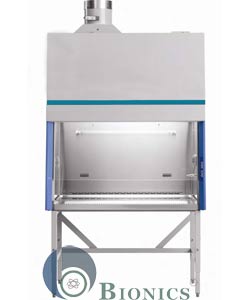Why You Need to Know About microbiological safety cabinet?
Why You Need to Know About microbiological safety cabinet?
Blog Article
Enhancing Laboratory Safety with Class 2 Biosafety Cabinets and Microbiological Protection

Maintaining a safe lab environment is crucial in today’s advanced research and clinical setups. Whether it's biotech development, pharmaceutical research, or microbiological analysis, biosafety cabinets form the backbone of contamination control.
Among the available options, Class 2 Biosafety Cabinets stand out for their balanced protection. These units are crucial for working with moderate-risk organisms and sensitive samples.
Biosafety Cabinets – How They Work and Why They Matter
Biosafety cabinets are specially designed, enclosed systems that ventilate and filter lab air. They use HEPA filtration to remove contaminants from incoming and outgoing air.
These units are generally classified into Classes I, II, and III depending on airflow and application needs. Among these, Class II units strike a balance between user, product, and environmental protection.
What Are Class 2 Biosafety Cabinets?
Class 2 Biosafety Cabinets are designed to safeguard three aspects: the operator, the sample, and the environment. They generate a vertical airflow that reduces turbulence and contamination.
Contaminated air is drawn into the cabinet and filtered through HEPA systems before recirculation or exhaust. These cabinets are suited for clinical, research, and pharmaceutical lab applications.
Essential Features of Class 2 Safety Cabinets
A Class 2 microbiological safety cabinet includes several integrated safety mechanisms such as:
• Medical-grade filters for capturing contaminants
• Steady air movement to reduce airborne particle circulation
• Inward airflow to keep aerosols contained
• Germicidal UV lamps to disinfect the work area
• Quiet operation and ergonomic design for user comfort
• Transparent sash or viewing window for easy access and monitoring
These elements ensure safety, comfort, and efficiency in day-to-day lab tasks.
Where Class 2 Cabinets Are Used
Class 2 Biosafety Cabinets are commonly used across microbiology, biotechnology, diagnostics, and pharma. They are critical for DNA/RNA extraction, pathogen culture, and molecular assays.
Hospitals, research labs, and manufacturing units depend on these cabinets for contamination control.
Why Laboratories Prefer Class II Safety Cabinets
Using Class 2 cabinets offers significant improvements in contamination control and user safety:
• Protects the integrity of lab work
• Shields operators from harmful aerosols and pathogens
• Ensures filtered air is safe for release or recirculation
These cabinets support biosafety goals while improving lab productivity.
Cabinet Types and Global Compliance
Top manufacturers design units compliant with major biosafety regulations worldwide. Class 2 units are sub-classified as A1, A2, B1, and B2—based on varying airflow balance and ducting needs.
• Type A2: Most commonly used cabinet model
• Type B2: Used for hazardous vapors and chemicals
Choosing the correct subtype is vital for achieving optimal safety and functionality.
Tips for Purchasing the Ideal Biosafety Cabinet
Before purchasing, consider:
• Your application type (e.g., diagnostics, pharma, research)
• Cabinet dimensions, ducting needs, and room layout
• Operational costs and technical support options
• Manufacturer reputation and post-sale support
Working with Biosafety Cabinets reliable manufacturers provides peace of mind and technical guidance.
Installation and Safety Guidelines
For optimal results:
• Avoid placing near doors, vents, or fans
• Schedule regular performance checks
• Educate staff on cabinet operations and safety
Operational best practices include:
• Maintain biosafety gear protocols
• Avoid sudden or quick arm movements
• Decontaminate surfaces before and after use
• Never activate UV when humans are present
Final Thoughts on Class 2 Biosafety Cabinets
Class 2 biosafety cabinets are essential for labs that value safety, precision, and cleanliness. They safeguard both research outcomes and operator health.
From clinical research to vaccine development, Class II cabinets maintain sterility in sensitive procedures. When investing in a biosafety cabinet, prioritise compliance, usability, and long-term support—because your research deserves the best protection. Report this page